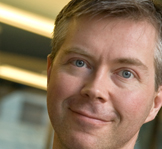Do you wish to be featured in the Two-Minute Interview? Would you like to learn more about one of your colleagues? Just answer the online questionnaire, or drop us a line at gazette@uOttawa.ca, or contact Sophie Deguire at 613-562-5708.

Jeremy Kerr
Associate professor, biology - Department of Biology
What is your most important function at the University and why?
Influencing public policy through discovery. Some of the worst by-products of rapid societal development are irreversible. Extinctions, for example, are now occurring at around 1,000 times the natural rate. Since we can’t reverse problems like that, we must find a way to prevent them from happening in the first place.
What inspires you the most about your job?
Making a difference. That difference could be in inspiring an individual student or by providing a constructive perspective on some broad issue of public policy, such as developing new endangered species legislation in Ontario.
How did you come to your area of research?
I came to focus on global change biology research through the realization that scientists in Canada did not seem to be speaking clearly or unequivocally about either the need to conserve our biological diversity or by communicating strategies to accomplish this fundamental goal.
What is your life’s proudest moment?
One of the things was helping lead a province-wide scientists’ policy contribution for the establishment of an endangered species legislation in the province of Ontario – where most of Canada’s endangered species are found. Nearly 200 scientists from university and research agencies from across the province signed our letter.
What would you change in the world today if you could?
To stop over consuming in such an utterly gratuitous and obviously unsustainable way. Do you really need that second SUV?
Who is the most influential person in your life? Why?
It is probably conservation biologist Paul Ehrlich, who founded Stanford University’s Center for Conservation Biology. He provided a lot of the research impetus for the science we now call conservation biology by combining really strong field ecology work with a clear-sighted view at broader scales.
What would your co-workers be most surprised to know about you?
That I can sometimes be patient, especially when it comes to preparing Indian dishes, such as chicken tikka masala, which takes a couple of days to make. I am NOT patient about conservation because every delay leads to a loss you can never get back. Extinction is forever.
What is your favourite pastime?
Trail running.
You’ve just won a $1 million. What do you do?
I’d get a really big pollinator garden going, instead of just using mulch. Or I’d get someone to do it for me.
What is your greatest quality?
Caring deeply about doing well through rigorous, far-reaching scientific contributions. This is the greatest quality to which I aspire.
Which five people (living or dead) would you like to invite to a dinner party? Tell us why.
Darwin, Einstein, Hu Jintao, Manmohan Singh, and my wife, Laura. Darwin is probably as insightful a biologist as there has ever been, seeing deeply into how the natural world works but also providing theories that have restructured human civilization. Einstein is similarly accomplished but in the field of physics. Between these two guys, they ought to be able to convince the leaders of China and India (which account for around 40 per cent of the world’s population) about the need to keep policies constrained by the biophysical realities of living on planet Earth, a harsh but necessary lesson that few seem yet to have embraced. I would be crazy to hold a dinner party without Laura, who is far more capable than me in nearly every respect and might have a better sense for how to lead a dinner chat with such absurdly challenging guests.
What is your greatest hope for the future?
That we don’t kill ourselves or too many of our fellow species while figuring out how NOT to behave, as a society, psychopathically. In other words, that we will evolve to consider more than our narrow self-interest. This is a fractal hope that applies to individuals, to communities, to political entities and economic groups within society.
What is the best kept secret in your faculty, department or service?
For most professors, what you see is what you get. We’re generally pretty nice, ethical, helpful, and caring — rather like other people everywhere. There is no ivory tower. Or, if there is, I would sure like the keys.